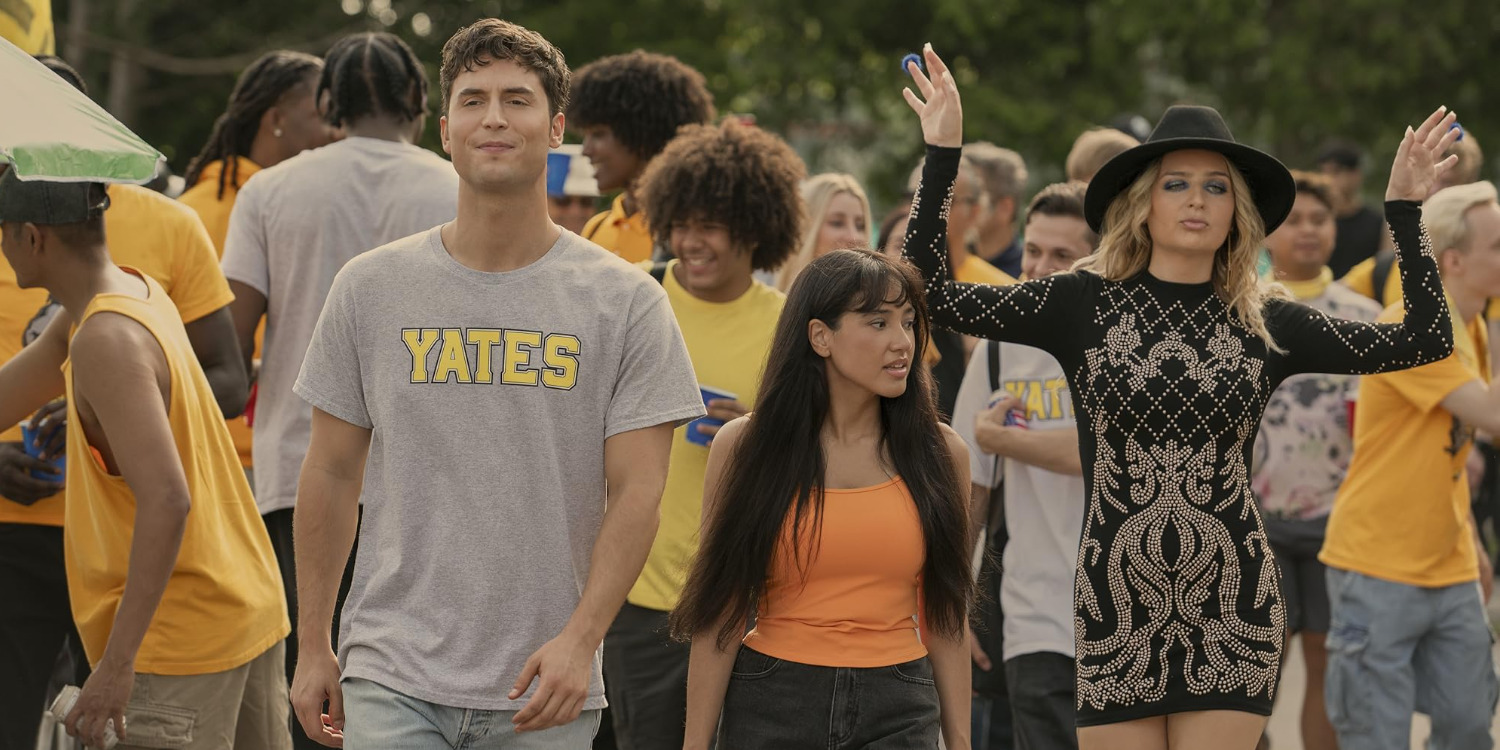Benito Skinner’s ‘Overcompensating’ is a bold comedy show about the uninhibited college days that unravel around a painfully inhibited freshman who is deep in the closet. Benny has carefully crafted a golden boy persona around himself, complete with being a star footballer, homecoming king, and valedictorian. Therefore, he has big hopes for college. Yet, none of these hopes include the intimidating task of finally embracing his sexuality and coming out as gay. However, a chance meeting with Carmen, a reject who perfectly complements his personality, makes it harder and harder for the latter to continue suppressing his true identity.
Thus, in trying to explore his reality without giving anything away, Benny finds himself delving into frenzied new misadventures with his newfound best friend. This Prime show presents a coming-of-age story about a woman and a gay man who unlock an authentic and profound friendship. In charting their narratives, the narrative naturally depicts the nuances of young queer experiences, particularly in relation to closeting. However, do these characters and their stories have any basis in reality?
Overcompensating is a Near-Autobiographical Story About College and Closets
‘Overcompensating’ offers a heightened comedic story about a closeted protagonist’s foray into college life, where he tries to strike a balance between exploring his sexuality without inadvertently outing himself. Even though this premise sends Benny down some hyperspecific routes, many of his experiences remain universally resonant to queer experiences in a refreshingly authentic way. This is a result of the show’s direct connection to creator Benito Skinner’s real life. Skinner, a comedian easily recognized through his work as an online content creator, mined his own biographical story and experiences to create the character of Benny and the on-screen world around him.

Skinner came out in his senior year at Georgetown University. Consequently, he had years of first-hand experience of what it can be like to force oneself into a closet. Even though his family had always been supportive of his more vibrant and theatrical side, he knew early on that the world wouldn’t necessarily reflect the same. For the same reason, he began shrouding himself in a more “straight-passing” image. He developed an interest in football and hid his fascination with shows like ‘Gossip Girl’ and ‘The Lizzie McGuire Movie’ monologues. Simultaneously, he also adopted a more monotone voice that added a stark difference to his personality, helping him blend in with society’s heternormativity. Lastly, and most importantly, he kept his queer idenitty strictly in the closet.
Nevertheless, bearing the brunt of the secret took its toll on Skinner, sending him into a depressive spiral. Ultimately, he was able to shed the closet and come out as his true and authentic self, which marked the beginning of a new, vastly-improved reality for him. Even though this was a deeply personal experience that Skinner underwent, he knew it was also a universal story that many queer people could relate to. Thus, by 2019, he began working on the earliest drafts for what would go on to become ‘Overcompensating.’ The creator took substantial inspiration from his own life, using hyperspecific anecdotes to add realistic beats to the on-screen story. Ultimately, although the show isn’t meant to be a biography and puts liberal amounts of fictional spins throughout its narrative, it still sustains a tangible foundation in real life.
Benito Skinner Modelled Benny as a Younger Version of Himself
Since Benito Skinner tailored ‘Overcompensating’ so much after his own experiences, the story’s Idaho-hailing protagonist inevitably ended up sharing a stark similarity to his own life. The link between them is most notably evidenced in the unconcealed parallel between Benny’s and the creator’s names. In the project’s initial development process, Skinner found it difficult to differentiate between himself and the protagonist he was creating and planning to portray. Nonetheless, as things progressed and the character’s identity became more and more fleshed out, he started to take on a life of its own. The actor/creator explained the surreal experience in a conversation with IndieWire.

“Initially, it (Benny’scharacter) felt so much like me, and now it does feel like a different character, kind of like a multiverse version of myself,” Skinner said before further adding, “It’s like (Benny) is me at times, but it’s been fun to find the things that are very different about us, and it allows me to play it without feeling too much of the emotional stuff. I think that that’s helpful for it to have that connection as far as performance, but the separation is necessary, and allows you to really not be limited in the writing of it.”
Consequently, while Benny’s character undoubtedly remains a reflection of Skinner and his experiences, he also stands out as a personality of his own. Even so, when the actor was preparing to get in the character’s mindset, he inevitably found himself trying to tap back into his younger years. From rewatching old videos to refamiliarize himself with his old restrained physicality, to hitting the gym to recapture the build of a football player, Skinner put in a lot of work in preparation for his performance. Thus, Benny’s character achieves his sense of realism both in terms of writing and performance.
Benito Skinner Created Carmen in the Image of Important Women From His Life
‘Overcompensating’ shines when it’s drawing from realistic experiences. Therefore, it’s no surprise that the co-protagonist, Carmen, also retains roots in reality. During his college days, Skinner had a female friend similar to Wally Baram’s character. She was the first person he ever came out to, and she even went on to become a catalyst in him meeting his partner, Terrence O’Connor. Therefore, the impactful relationship that changed the creator’s life formed the basic premise of the show as a platonic love story between a closeted gay man and his female best friend.

Additionally, Skinner also took inspiration for Carmen from a number of instrumental women from his life, including his grandmother, after whom he named the character. “The relationship between gay men and women feels so funny and tragic and complicated, and I don’t know if I’ve seen it on screen depicted in that way,” He told Women’s Wear Daily. “So it felt like such a rich relationship and a rich experience in my own life that I still carry with me to draw from, with the tapestry of college.”
As such, Carmen’s authentic relationship with Benny informs the realism behind their friendship that remains at the show’s nucleus. Furthermore, her character struggles and grows in her own unique ways throughout the narrative, carving out an identity for herself. Much like Benny, her own complications revolve around the idea of overcompensating for her perceived shortcomings to earn the love and appreciation of those around her. Even though this manifests in different ways for her than her co-protagonist, the realism behind her own struggles with social isolation, grief, and slut-shaming, shapes her into an equally authentic individual.
Read More: Overcompensating Ending Explained: Does Benny Come Out?


